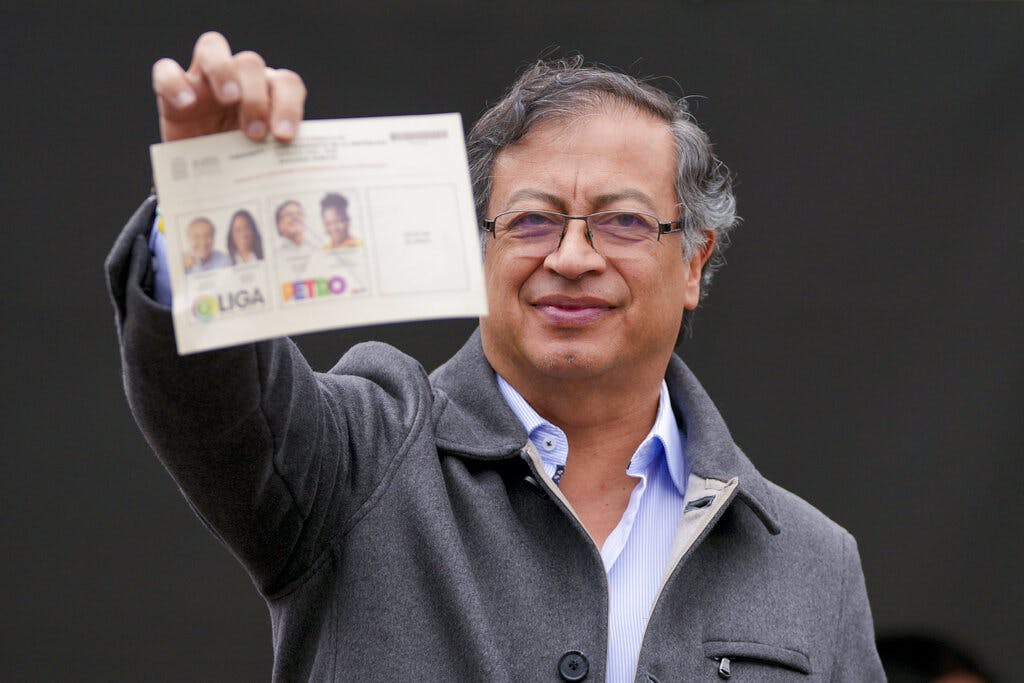Friends Or Foes: Rise of Leftists South of America Raises Delicate Questions
After a former terrorist wins Colombia’s presidency, the U.S. secretary of state celebrates ‘shared democratic values,’ but it may be Venezuela and other American foes that are seeing the most gains.

Is the red political wave engulfing countries all the way from Mexico to Argentina a boon for America, or is danger lurking as China, Russia, and Iran-backed terrorists gain footholds in our backyard?
Secretary of State Blinken recently called to congratulate the latest addition to the growing collection of Latin America’s populist-left leaders, Gustavo Petro, Colombia’s president-elect. Mr. Blinken “underscored our countries’ shared democratic values,” a State Department press release said.
Does Mr. Petro truly share our values, or is he more attuned to Venezuela’s president, Nicolás Maduro, who also called to offer his blessings to the former Venezuelan-backed Colombian terrorist? As Caracas’s vice president, Diosdado Cabello, tweeted, he sent “Bolivarian hugs.”
Beyond Colombia, the rise of left-leaning leaders across Latin America strengthens Caracas and its regional allies in Havana and Managua. Never mind that Venezuela’s basket-case economy and oppressive ways symbolize the bankruptcy of its America-averse Bolivar revolution.
Meanwhile, America’s global foes, including the “death to America” Iranian regime, are pushing ever closer to our borders.
When President Biden hosted the Summit of the Americas at Los Angeles earlier this month, he declined to invite leaders from non-democratic Venezuela, Cuba, and Nicragua. In solidarity with them, Mexico’s populist-leftist president declined to show up.
Argentina’s president did come, but he berated Mr. Biden, saying he regretted “greatly the non-presence of countries that have not been invited.” President Fernandez vowed to serve as the voice for his absent companeros.
The Venezuelan strongman, meanwhile, flew to Tehran instead of Los Angeles. There, he signed a 20-year cooperation pact that formalized Iran’s foothold in Venezuela and cemented relations between Tehran’s Islamist revolutionaries and Caracas’s Bolivarian revolutionaries.
It wasn’t that long ago that Iranian agents plotted to kidnap an American citizen and Iranian dissident, Masih Alinejad. According to the FBI, they planned to hustle her onto a speedboat to Caracas, from where she would be shipped to Iran for a public hanging.
Yet, even the country that suffered the worst Iranian-backed attack in South America, Argentina, is now cozying up to the Iran-Venezuela axis.
A mysterious cargo plane carrying auto parts has been held up at Buenos Aires since early this month. Its suspiciously large crew includes five Iranian and 13 Venezuelan nationals. The captain, Gholamreza Ghasemi, is a top member of the Islamic Revolutionary Guard Corps.
An Argentinian court, on a request from the Jewish community, has ordered an investigation and confiscated crew members’ passports and electronic equipment. Members of Argentina’s security apparatus suspect that the IRGC agents and their Venezuelan cohorts flew across the region to recruit and cultivate local assets.
President Fernandez, however, is unconvinced. On Saturday he told Argentina’s Radio 10 that the affair “is not — something dark.” Rather than due to suspicions of terrorism, he said, the cargo plane was grounded because of refueling problems related to American sanctions on Venezuela.
Mr. Fernandez’s vice president, Cristina Kirchner, is widely believed to be the most powerful member of his government. During her tenure as head of state between 2007 and 2015, Argentina became close to Tehran.
Most Argentinians are convinced that Iran masterminded a 1992 attack on the Israeli embassy at Buenos Aires and a 1994 bombing of the Jewish community center there, AMIA, which was the largest terrorist act in the country’s history. Mr. Fernandez is therefore aware that it would be politically difficult to once again defend suspected Iranian terrorists. Venezuela is a different story. Earlier this year Mr. Fernandez vowed to renew ties with the Caracas regime.
Washington, which reportedly alerted Argentina to the possible terrorist infiltration, is “following with great interest the judicial and law enforcement investigations,” the American ambassador to Buenos Aires, Marc Stanley, said in a statement.
By dismissing the affair as a mere fueling issue, however, Mr. Fernandez is signaling that relations with Venezuela are as important to him, or even more so, than ties to Washington. He does so even at the risk of bringing back the same type of terrorism that Argentina suffered in the 1990s.
“As a mysterious plane flies around the continent and intelligence officers are trying to understand its relation to Iranian terrorism, all arms of government in Argentina and other Latin countries must investigate professionally, free of political bias,” a former Israeli diplomat, Daniel Carmon, says.
Mr. Carmon was at the Israeli embassy in Buenos Aires in 1992. His wife, Eliora, who also worked at the embassy, was killed in the terrorist attack. “The combination of Iran and South America is bad news,” he told the Sun, adding that the cargo plane affair “should be a wakeup call for all leaders in the hemisphere.”
While Argentina’s security officials and the courts heed the warning, the country’s president seems to be playing footsie with Venezuela and, by inference, with Iran. He is part of a growing political axis that does not necessarily share what Mr. Blinken calls “our values.”

